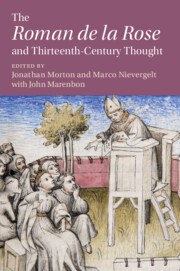Book contents
- The Roman de la Rose and Thirteenth-Century Thought
- Cambridge Studies in Medieval Literature
- The Roman de la Rose and Thirteenth-Century Thought
- Copyright page
- Contents
- Contributors
- Acknowledgements
- Note on Primary Texts
- Introduction
- Part I Epistemology and Language
- Part II Natural Law, Politics, and Society
- Chapter 5 The Personal and the Political
- Chapter 6 Human Nature and Natural Law in Jean de Meun’s Roman de la Rose
- Chapter 7 A Politico-Communal Reading of the Rose
- Part III Unfinished Business
- Notes
- Bibliography
- Index
- Cambridge Studies in Medieval Literature
Chapter 5 - The Personal and the Political
Love and Society in the Roman de la Rose
from Part II - Natural Law, Politics, and Society
Published online by Cambridge University Press: 17 June 2020
- The Roman de la Rose and Thirteenth-Century Thought
- Cambridge Studies in Medieval Literature
- The Roman de la Rose and Thirteenth-Century Thought
- Copyright page
- Contents
- Contributors
- Acknowledgements
- Note on Primary Texts
- Introduction
- Part I Epistemology and Language
- Part II Natural Law, Politics, and Society
- Chapter 5 The Personal and the Political
- Chapter 6 Human Nature and Natural Law in Jean de Meun’s Roman de la Rose
- Chapter 7 A Politico-Communal Reading of the Rose
- Part III Unfinished Business
- Notes
- Bibliography
- Index
- Cambridge Studies in Medieval Literature
Summary
This article concentrates on manifestations of medieval political philosophy in the Rose. It focuses on two crucial themes for understanding the foundations of political and social life: the origins of political community, private property and other social institutions; and the relationship between love and justice, and the political relevance of these two concepts. The article first discusses Jean de Meun’s view concerning the origins of social institutions, and relates it to Ciceronian and Augustinian traditions, which had a deep influence on medieval political philosophy. The main focus of the article is on the relation between Jean’s political ideas and medieval understanding of Aristotle’s political philosophy and moral psychology. It is argued that the political role of love and justice cannot be understood without taking medieval Aristotelian philosophy seriously. Instead of trying to find historical and textual connections between individual medieval philosophers and Jean’s poem, the article embraces a different methodological approach: it aims to understand the philosophy behind the poem. This aim is achieved by reading relevant passages against medieval adaptations of Aristotle’s practical philosophy. The article thus charts possible connections between scholasticism and the Rose and aims to show that they should be understood against thirteenth-century Aristotelian philosophy.
Keywords
- Type
- Chapter
- Information
- The ‘Roman de la Rose' and Thirteenth-Century Thought , pp. 111 - 130Publisher: Cambridge University PressPrint publication year: 2020

